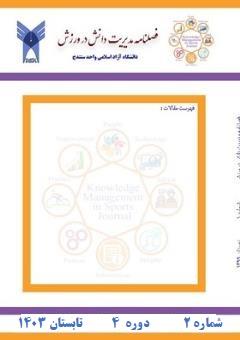اثر هوشمندی رقابتی بر توسعه پایدار و عملکرد باشگاههای ورزشی استان کردستان
محورهای موضوعی : بازاریابی ورزشی
بهزاد ایزدی
1
,
آرمان اله ویسی
2
![]() ,
فرشته قادری
3
,
فرشته قادری
3
1 - دانشگاه کردستان
2 - دانشگاه کردستان، سنندج، ایران
3 - دانشگاه کردستان
کلید واژه: هوشمندی رقابتی, توسعه پایدار, عملکرد, باشگاههای ورزشی,
چکیده مقاله :
پژوهش حاضر با هدف تعیین اثر هوشمندی رقابتی بر توسعه پایدار و عملکرد باشگاههای ورزشی استان کردستان صورت گرفت. جامعه آماری در این تحقیق، مدیران و کارکنان باشگاههای ورزشی استان کردستان بودند که تعداد نمونه با استفاده از روش نمونهگیری تحقیقات غیرآزمایشی و با استفاده از فرمول کوکران، 303 نفر انتخاب شد. برای ﺟﻤـﻊآوری دادهﻫــﺎ در ﺗﺤﻘﻴــﻖ ﺣﺎﺿــﺮ مجموعاً 49 سوال از پرسشنامه عملکرد سازمانی، پرسشنامه هوشمندی رقابتی و پرسشنامه توسعه سازمانی ﺑﺎ ﻃﻴﻒ ﻟﻴﻜﺮت استفاده شد. روایی و پایایی پرسشنامه ها نیز مورد ارزیابی قرار گرفت که در سطح مطلوبی بود. ﺟﻬــﺖ ﺗﺠﺰﻳـــﻪ و ﺗﺤﻠﻴـــﻞ دادهﻫـــﺎی آﻣـــﺎری از نرمافزارهای AMOS و SPSS اﺳـﺘﻔﺎده شد. نتایج پژوهش حاضر نشان داد که ابعاد هوشمندی رقابتی بر ابعاد توسعه پایدار باشگاههای ورزشی (51/0) و عملکرد باشگاههای ورزشی (60/0) تاثیر دارند. همچنین ابعاد توسعه پایدار بر عملکرد باشگاههای ورزشی (89/0) و ابعاد هوشمندی رقابتی از طریق متغیر میانجی ابعاد توسعه پایدار بر عملکرد باشگاههای ورزشی (45/0) تاثیر دارند. بر اساس نتایج پژوهش آگاهی از بازار و رقبا، داشتن استراتژیهای خاص و استفاده از فناوریهای نوین در باشگاه تاثیر مستقیمی بر بهبود عملکرد خواهد داشت. همچنین توجه به ابعاد توسعه پایدار مثل مسائل زیستمحیطی، اقتصادی، اجتماعی و نهادی عملکرد باشگاهها را بهبود میبخشد.
The current research was conducted with the aim of determining the effect of competitive intelligence on the sustainable development and performance of sports clubs in Kurdistan province. The statistical population in this research were managers and employees of sports clubs in Kurdistan province, and the sample number was 303 people selected using non-experimental research sampling method and using Cochran's formula. To collect data in the current research, a total of 49 questions from organizational performance questionnaire, competitive intelligence questionnaire and organizational development questionnaire with Likert scale were used. The validity and reliability of the questionnaires were also evaluated, which was at a favorable level. AMOS and SPSS software were used to analyze and analyze statistical data. The results of this research showed that the dimensions of competitive intelligence have an impact on the dimensions of sustainable development of sports clubs (0.51) and the performance of sports clubs (0.60). Also, the dimensions of sustainable development have an effect on the performance of sports clubs (0.89) and the dimensions of competitive intelligence have an effect on the performance of sports clubs through the mediating variable of sustainable development dimensions (0.45). Based on the results of the research, awareness of the market and competitors, having special strategies and using new technologies in the club will have a direct effect on improving performance. Also, paying attention to the dimensions of sustainable development such as environmental, economic, social and institutional issues improves the performance of clubs.


